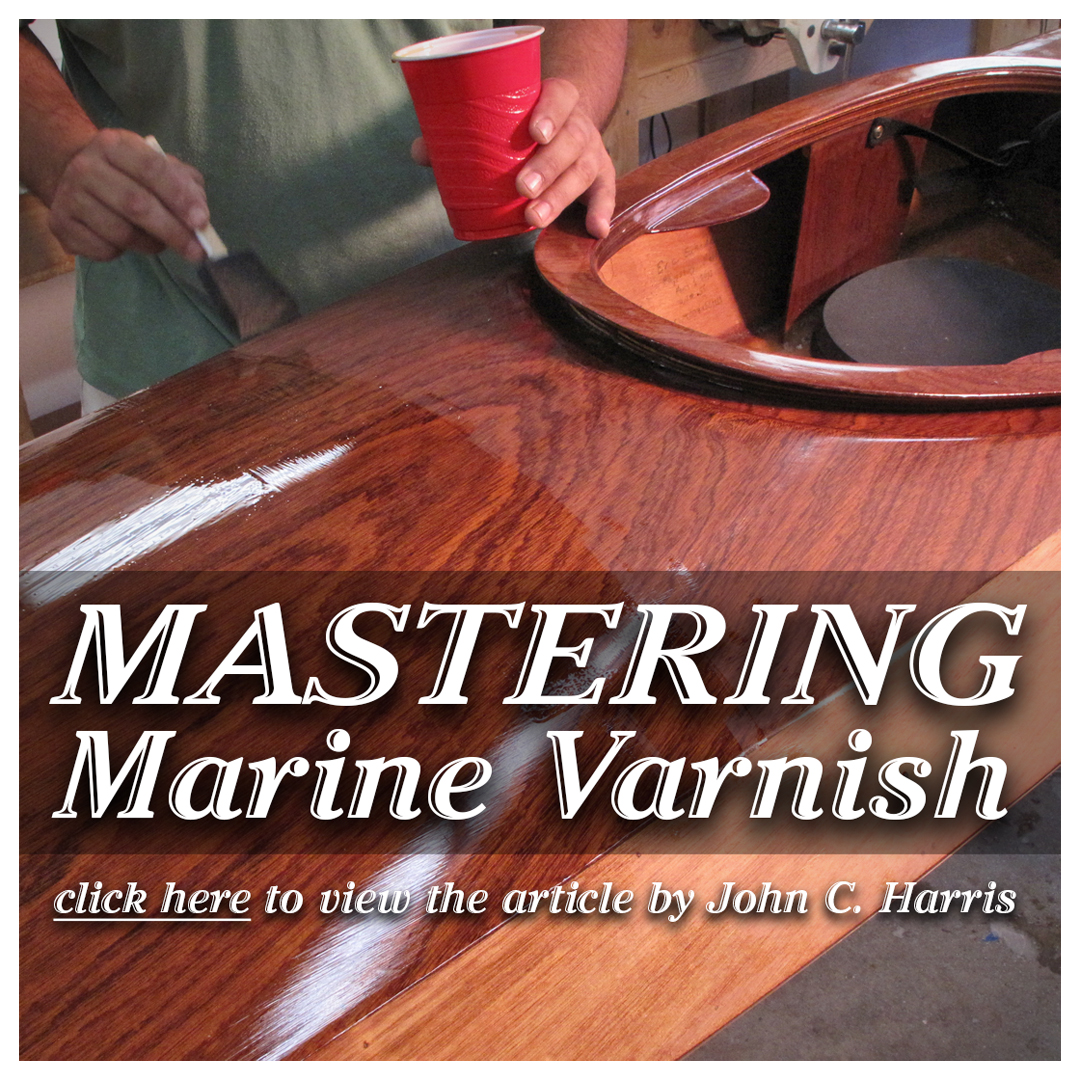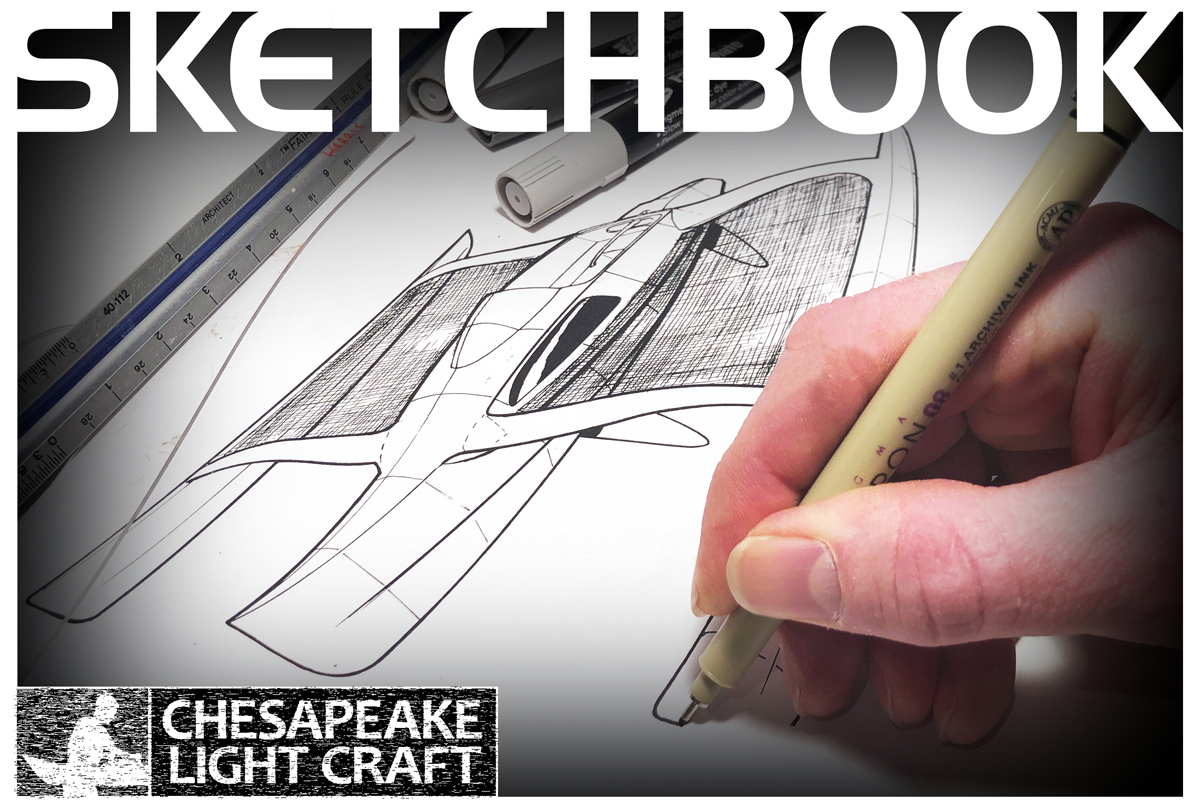Builders' Forum |
|
| ↓ Scroll to Last Comment ↓ | Forum Guidelines | Builders' Forum | |
The instructions for my wherry say to rub everything with denatured alcohol (methylated spirits here in Australia), but a test on a hidden spot left the epoxy soft and tacky. Is this step necessary? Any experience? Thanks
Scott
26 replies:
RE: Denatured alcohol
Hi Laszlo,
I applied this epoxy several months ago (as far back as March - I know, this build is starting to drag on) so I can't imagine that it hasn't fully cured. I have looked into what denatured alcohol is called here in AUS, but I wonder if the formula mightn't be the same. I'll check with my local chandler and see what they say.
Thanks for your help.
Scott
RE: Denatured alcohol
Sometimes if the 2 part epoxy mix is not mixed well enough or not enough hardener is used, the epoxy may never set.
RE: Denatured alcohol
Thanks for your thoughts. I'm absolutley confident that they epoxy was mixed thoroughly. I asked a friend and local shipwright and he wondered if the eopxy returned to a hardened state and it did. I'm still wary, and I've asked this before, but is the alcohol rub critical? Some have suggested soapy water and a good rinse prior to varnishing. Any opinions.
Scott
RE: Denatured alcohol
I'd do a web search of your resin manufacturer and see what they say. In any case, it sound like your methylated spirits has something that U.S. denatured alcohol doesn't, and I wouldn't use it any more.
Here's an example of West System's advice on final preparation from their FAQ:
- Allow the final epoxy coat to cure thoroughly.
- Wash the surface with a Scotch-brite™ pad and water to remove amine blush. Dry with paper towels.
- Sand to a smooth finish (Figure 32). If there are runs or sags, begin sanding with 80-grit paper to remove the highest areas. Sand until the surface feels and looks fair. Complete sanding with the appropriate grit for the type of coating to be applied-check coating instructions. Paint adhesion relies on the mechanical grip of the paint keying into the sanding scratches in the epoxy's surface. If a high-build or filling primer is to be applied, 80-100 grit is usually sufficient. 120-180 grit may be adequate for primers and high-solids coatings. Finishing with 220-400 grit paper will result in a high-gloss finish for most paints or varnishes. Grits finer than this may not provide enough tooth for good adhesion. Many people prefer wet sanding because it reduces sanding dust and it will allow you to skip Step 2.
- After you are satisfied with the texture and fairness of the surface, rinse the surface with fresh water. Rinse water should sheet evenly without beading or fisheyeing. If rinse water beads up (a sign of contamination), wipe the area with solvent and dry with a paper towel, then wet sand again until beading is eliminated.Proceed with your final coating after the surface has dried thoroughly. To reduce the possibility of contamination, it is a good idea to begin coating within 24 hours of the final sanding. Follow all of the instructions from the coating system's manufacturer. A good trick used by professionals, is to make a test panel to evaluate the degree of surface preparation required and the compatibility of the finish system.
RE: Denatured alcohol
"Rub" with .........................I think you are reading that wrong......or it is too strong a word.
"Wipe" with denatured alcohol dampend cloth might be a better description. I've never had a problem with it. It is more of a tack cloth than a "rubbing" or soaking operation.
RE: Denatured alcohol
I have often used paint "thinner". Something that cleans and evaporates without leaving a residue.
RE: Denatured alcohol
Methylated spirits is what we call methanol here in the usa. What they sell here as denatured alcohol is ethanol with something added to it to make it poisonous so you can't drink it. That might be your issue. I any case the alcohol wipe is not a requirement. For just cleaning wood or epoxy without raising wood grain you can use mineral spirits. For removing blush from epoxy before varnishing, you can use a soapy water wash or a diluted ammonia-water rinse.
RE: Denatured alcohol
Coco:
Here's what I think about your problem, from everything I've read as a curious amateur over the years.
1. Cured epoxy is impervious to methanol and to ethanol (denatured or not...the additives are only chosen for their ability to make you vomit and resolve to repent of your evil bootlegging ways) (and to acids, bases, polar solvents, non-polar solvents, reducing agents, oxidizing agents, and almost everything else). So if methanol or ethanol softened the finish, that finish was not cured epoxy, for whatever reason. We all make material selection/mixing/application mistakes and don't always discern them after the fact.
2. If your finish is cured epoxy and you put something on it that softened it, then that something wasn't just methanol and it wasn't just ethanol. I know that properly cured epoxy isn't impervious to everything, since some specialized products are sold that remove it. But it seems unlikely that those specialized chemicals that do would be included in the formulation of a general purpose methanol or ethanol-based solvent, even in a free-spirited land like Oz.
So, whether the OP is correct (Oz.MethylatedSpirits == US.DenaturedEthanol), or NYyaker is correct (it's methanol, not ethanol at all), it can't attack cured epoxy.
If denatured ethanol really could attack cured epoxy, it is almost certain that people with long professional expertise in both epoxy chemistry and boatbuilding with epoxy (like Laszlo) would have experienced it.
I am not an expert in this subject and these are only my speculations. I hope you will share the results of your further research into the mystery.
RE: Denatured alcohol
Will Isopropyl alcohol work or is it different than denatured? (Have lots of isopropyl)
RE: Denatured alcohol
100% isopropyl should be ok but might prove to be pricey. Most isopropyl is watered down to some extent and drug store or rubbing alcohol should be avoided like a tax audit. Also, I read somewhere that it should be used only for wiping down bare wood and epoxy, not varnish. You should check the manufacturer's recomendations for application tips. I use Interlux solvent 333 to wipe down between coats of Interlux Schooner #96.
RE: Denatured alcohol
I noticed the same effect as the OP: I wiped down cured epoxy with Denatured Alcohol and the surface got tacky. It didn't last long, the effect disappeared a few minutes after the alcohol evaporated, but it did happen. I am using Kleen-Strip brand Denatured Alcohol from Home Depot in Los Angeles. We are subject to the regulations of the Air Quality Management District, so our CA formula may be different from that used elsewhere. BTW, the epoxy had been cured for about a month and was hard as nails.
RE: Denatured alcohol
I forgot to mention that this happens to every epoxied part: no matter which batch it is from, no matter when I mixed it. Now I could have miscounted the 1:1 pumps from the MAS dispenser once, maybe twice(I doubt it), but to think that every single time I mixed the stuff I miscounted seems unlikely. I simply cannot deny the repeated evidence of my own eyes and fingers, no matter how many post that "epoxies are impervious to alcohol and solvents". The epoxy might be impervious, but SOMETHING is temporarily happening to it.
RE: Denatured alcohol
I am very interested in your observation of alcohol makiing cured epoxy tacky! It goes against everything I have read. It might be worthwhile to inquire on West Systems' website. There has to be a scientific solution to this puzzle.
RE: Denatured alcohol
I've never seen denatured alcohol (at least what is called such in 'Murca) soften epoxy.
The only thing I've seen do that is lacquer thinner, and maybe acetone, and even then it took a LOT of it. At intervals we pile all of the shop C-clamps in a 5-gallon bucket, pour in a gallon of lacquer thinner, and clamp the lid shut. A few days later, we can get all of the epoxy off the screw threads with a wire brush. Lacquer thinner is a very nasty chemical and strenuous precautions have to be taken.
What brand epoxy are you using?
RE: Denatured alcohol
John,
I am using the MAS epoxy that came in my kit. Let me hasten to say that there has never been a problem with the epoxy on my kit. I just wanted to chime in and post my observations. The alcohol wets the surface one is wiping, it then evaporates, but the surface of unsanded epoxy is tacky to the touch for a period and then returns to its normal condition. I will have to experiment to see if the same thing happens to sanded epoxy. Maybe it is some sort of "blush" that is reacting with a denaturing additive in the alcohol, there are literally hundreds of them I have read.
RE: Denatured alcohol
I will toss some hardened peanut butter I to a bowl of alcohol for a while and see what happens....
RE: Denatured alcohol
I soaked a half moon of cured peanut butter off the lip of a solo cup in my alcohol for an hour or so. The wood flour and epoxy cured about a week ago and was hard and brittle. After an hour in the cup I could bend it almost 180* before it broke. So there is SOMETHING going on....... Despite what the experts proclaim, I have to believe my eyes. Epoxy is NOT impervious to denatured alcohol
RE: Denatured alcohol
Chester,
i think it would be a really interesting experiment if you repeat it without using wood-flour thickened epoxy. just use an unadulterated epoxy disk.
or if you still have some of your dry wood-flour/epoxy mix left, to let it soak in water and let us know your result.
i am wondering if the wood-flour itself is what is being effected by the soaking in alcohol. the water-proofing (and i assume alcohol proofing) capability of epoxy is based on epoxy resin of a certain minimum thickness.....and even then for only a certain amount of time before the epoxy itself actually conducts water through.
i have a bit of experience in barrier coats and fibreglass hull repair/osmotic blistering and the like.
so i am thinking/wondering if you simply conducted alcohol into the wood flour. i say that becuase when i mix up 'peanut butter' consistency wood-flour epoxy....it is less dense than pure epoxy....which seems to imply that the wood particle is coated....but is actually dry inside. and the alcohol, may be leaching into wood and changing the property of the epoxy/wood-flour mix which may explain the result you are getting.
Howard
RE: Denatured alcohol
As luck would have it I have been glassing the interior of my Yawl this week and had a trashcan full of hardened clear epoxy. I went out and dug down to the bottom for the oldest solo cup with an epoxy disk on the bottom, pulled the brush with the epoxy on it like a popcicle out of the cup and plunked it into another cup filled with denatured alcohol. Within an hour the brittle flakes and shards around the edge of the dick had softened into a rubbery clear substance that crumbled when rolled between the fingers. The solid disk has softened to the point where I can easily scrape it away with my thumbnail and leave a gouge about 1/16" deep in the surface. The removed material is jelly-like.
Denatured alcohol softens cured epoxy. Period, no doubt about it. Before anyone starts to quote the literature at me, just try it yourself. Do the experiment first before you deny that this is happening. This effect happens, it is real.
RE: Denatured alcohol
I'll back that up. I'm also using Kleen-strip alcohol on MAS epoxy. It takes a while for the alcohol to have an effect, so I never noticed it when just wiping the surface with a rag since even small puddles evaporated too quickly. But, if you soak the epoxy it definitely softens it. The epoxy hardens again when it dries out, but I would be curious to know if it loses any strength as a result.
RE: Denatured alcohol
Forgot to add, that with regards to solvents, impervious doesn't always mean "totally unaffected by." For example, with chemical gloves if you read the spec sheet the manufacturer will list all the different solvents that glove is effective against, and the breakthrough time for each one. You'd probably have to go back to the spec sheet for the epoxy and find out what the breakthrough time for alcohol is for a given film thickness and if there are any permanent effects on the epoxy. I'm going to go out on a limb and say there's probably nothing to worry about unless you plan on sailing on a lake of denatured alcohol (which I would advise against for other reasons anyway).
RE: Denatured alcohol
wow....had never really dove into this....thanks chester for the experimental results.
in all the things we do, i suspect there are some things we just pick up, they appear to work, and we don't get into the phsics or chemistry of it....and some things that catch our interest and we do a deep dive.
so i spent some time this morning doing a literature search on the topic and i think psimian probably described it best.
denatured alcohol is clearly a solvent that interacts with epoxy (in some cases used as a thinner)......albeit a relatively weak solvent compared to acetone and other solvents that came up in my read.
that said, used as a quick wipedown on a fully cured surface, it should evaporate quickly and does not appear to be a concern to any of the major manufacturers who happily endorse an alcohol wipedown as part of the surface prep instructions for re-coating a cured surface.
i think what was interesting in what i read was the number of physical factors that come into play when working with epoxy. for example, i was reminded that what we typically call fully cured is not where the process really stops and full curing activity can be occurring many days after an epoxy has acheived the majority (90%+) of its ultimate strength and is hard to the point of being non-dentable, though clearly at a very reduced rate. for those of you who have built and held epoxy boats for a long time, think 'print-through' and how long that takes to show up.
based on my read, my sense is that the differences in observations of 'tackiness' are probably due to variations across a number of factors including 1) how agressive and how much time the wipe down is, 2) temperature and other factors that effect the evaporation rate of alcohol, 3) variations in formulations of various denatured alcohol product, 4) where along the 'cured' continuum the underlying epoxy is and 5) how sensitive is one to determine that something is actually 'tacky'
my tune after all of this is as psimian says and chester's experiments point out, you definitely don't want to do an extended passage on a epoxy coated boat on a sea of denatured alcohol. save that for your plastic craft.
RE: Denatured alcohol
I don't think the alcohol is doing the slightest harm to the epoxy when used as a pre-paint or pre-epoxying wipe down. In fact, I wouldn't be surprised if it helped to promote a better chemical bond between the coats of epoxy, but am only guessing. I only posted about my observation because others were skeptical of the OP's experience when I had the same thing happen to me.
If you google denatured alcohol you get a list of all the denaturing additives and there are a lot of solvents among them. I suppose a MSDS (Material Safety Data Sheet) would have the contents, if not the proportions. Alcohol may not be the only active ingredient at work here....
RE: Denatured alcohol
Hey Chester Yall..for some reason I can only post from my phone and need to talk to you about this topic...could you please call me..830/997-8120...thanks!













RE: Denatured alcohol
» Submitted by Laszlo - Wed, 12/4/13 » 8:14 AM
Scott,
That sounds as if your epoxy hadn't finished curing before you cleaned it. Once the cure is complete the alcohol has no effect on the epoxy.
The reason to use the alcohol to clean the boat is that it dissolves oily deposits (like finger and palm prints), picks up fine dust and quickly evaporates from the wood. I've been using it for over 10 years and have had no problem with it. It's my cleaning liquid of choice for woodworking projects.
Just make sure your epoxy's cured and have plenty of ventilation.
Laszlo